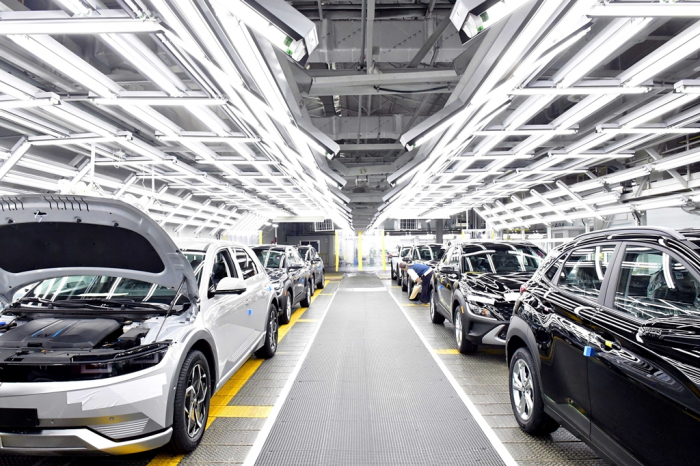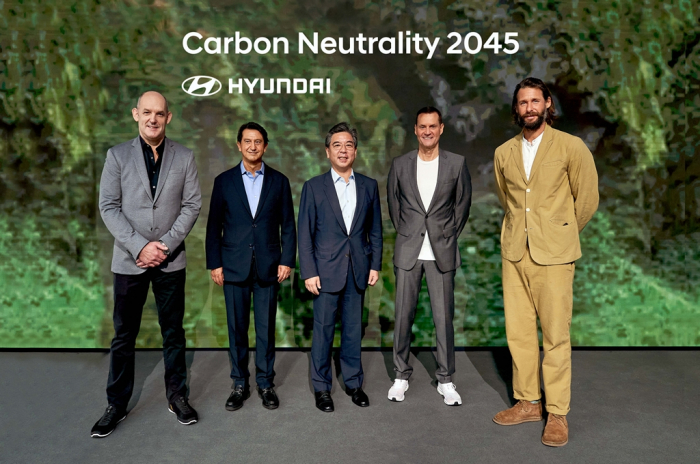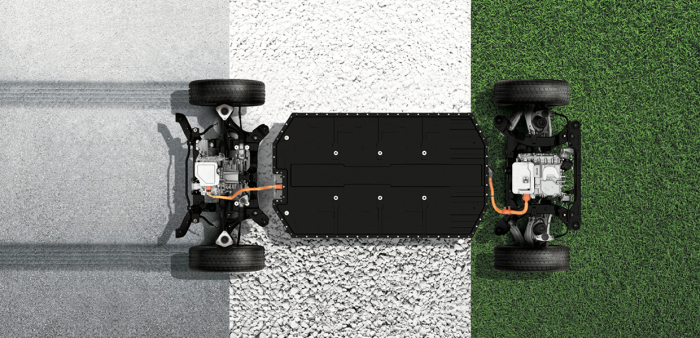Automobiles
Hyundai Motor to build more solar cell facilities to power Ulsan plant
Mercedes-Benz and GM are also building their own power generation facilities to ensure a stable supply of power
By Oct 25, 2022 (Gmt+09:00)
3
Min read
Most Read
LG Chem to sell water filter business to Glenwood PE for $692 million


Kyobo Life poised to buy Japan’s SBI Group-owned savings bank


KT&G eyes overseas M&A after rejecting activist fund's offer


StockX in merger talks with Naver’s online reseller Kream


Mirae Asset to be named Korea Post’s core real estate fund operator



South Korea’s top automaker Hyundai Motor Co. will build additional solar cell power generation facilities at its main plant in Ulsan amid a manufacturing industry shift toward renewable energy for carbon neutrality.
Hyundai will start building more solar cells at the Ulsan plant next month to increase power generation capacity to 15 megawatts from the current 9 megawatts, industry sources said on Tuesday. Construction work will be completed by September 2023.
As a result, the automaker will be able to secure about 20,000 MWh of electricity from solar power at its main plant in Ulsan. That will represent about 1.5% of its annual energy use of 1.29 million MWh supplied by state-run Korea Electric Power Corp.
Hyundai is also considering expanding the 10 MW solar cell facilities at its Asan plant and raising photovoltaic power generation capacity at its research centers to 3 MW from the current 562 kilowatts, they said.
Hyundai Motor said in May it will build a liquefied natural gas-fueled power plant to secure a stable supply of electricity for its factories and embrace the global paradigm shift toward eco-friendly practices by cutting carbon emissions.
However, the company scrapped the plan two months later after the European Parliament’s environment and economy committee in June declared that natural gas and nuclear power weren’t classified as eco-friendly energy sources.

SOLAR ENERGY TO POWER HYUNDAI’S GEORGIA PLANT
Hyundai Motor has said it will gradually expand its power generation business to include a project that stores electricity produced by solar power in an energy storage system (ESS) recycled from waste batteries.
New car manufacturing plants, including an electric vehicle factory currently under construction in the US state of Georgia, will be equipped with solar panels as a default, according to the carmaker.
Hyundai’s plan to build its own renewable energy generation facilities is part of Hyundai Motor Group’s vision to achieve carbon neutrality by 2045.
In his New Year’s speech in January, Hyundai Motor Group Chairman Chung Euisun said the group aims to become a top-tier eco-friendly auto brand.
He said the group, which owns Hyundai Motor and sister firm Kia Corp., plans to go carbon neutral in the group's entire processes, from automaking to vehicle disposal, to drastically cut carbon emissions.
Hyundai Mobis Co., the auto parts-making unit of Hyundai Motor Group, said in July that its operations around the world will use renewable energy for 65% of its electricity needs by 2030, and all of its electricity needs by 2040.

The auto parts maker recently completed the construction of solar power facilities at its domestic production plants in Ulsan, Daegu and Gimcheon. Another solar power facility at its Changwon plant will be completed next month, bringing its total solar power capacity at the four factories to 2.5 MW.
HYUNDAI’S RIVALS TO GO GREEN
Major automakers around the world are striving to build their own electricity generation facilities to power their car factories with renewable energy as the Russian invasion of Ukraine and climate change set off alarm bells about the need to establish a stable self-sufficient power supply source.
German carmaker Mercedes-Benz recently announced that it would build a wind power plant on its driving track in Germany by 2025.
The company plans to invest millions of euros in solar power facilities as part of its goal to procure 70% of electricity from renewable energy by 2030.
General Motors Co. has established a new business unit called GM Energy to produce and sell electricity.
The plan is to build energy storage systems with batteries made at Ultium Cells, its joint venture with Korea’s LG Energy Solution Ltd., store electricity produced by solar power, and sell it to companies and individuals.
Write to Hyung-Kyu Kim at khk@hankyung.com
In-Soo Nam edited this article.
More to Read
-
 AutomobilesHyundai Motor to build LNG plant to power its factories
AutomobilesHyundai Motor to build LNG plant to power its factoriesMay 09, 2022 (Gmt+09:00)
3 Min read -
 Carbon neutralityHyundai Mobis to power all plants with 100% renewable energy by 2040
Carbon neutralityHyundai Mobis to power all plants with 100% renewable energy by 2040Jul 11, 2022 (Gmt+09:00)
2 Min read -

-
 Future mobilityHyundai’s Chung charts vision as top-tier eco-friendly auto brand
Future mobilityHyundai’s Chung charts vision as top-tier eco-friendly auto brandJan 03, 2022 (Gmt+09:00)
3 Min read -

Comment 0
LOG IN


